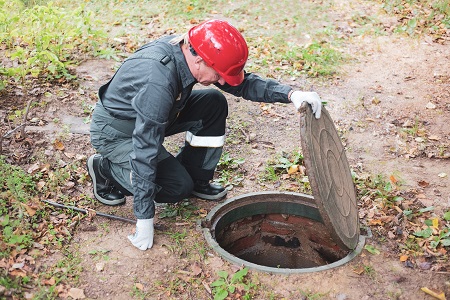You’re about to discover the crucial role of regular septic system inspections. They’re not just mandatory. They’re your best defense against hefty repair bills. By spotting common problems early, you can take preventive measures to avoid serious damage.
Let’s delve into the nitty-gritty of septic inspections, how to prepare for them, how they can help you avoid septic repair services, and how to understand your inspection report.
It’s time to safeguard your system and wallet.
The Importance of Regular Septic System Inspections
You’re underestimating the importance of regular septic system inspections if you think they’re not a crucial part of home maintenance. Every three to five years, you should be hiring a professional to perform a detailed evaluation.
They’ll check the tank’s water level, inspect the baffles, and evaluate the drain field’s condition. Overlooking these inspections could lead to disastrous consequences.
Excess water or a blockage can cause your tank to back up or overflow, leading to costly repairs. Worse, a failure in the drain field can contaminate your property’s groundwater.
Don’t let a lack of routine inspections become a financial burden down the line. Regular inspections are a small investment that’ll save you from potential headaches and hefty repair bills.
Preventive Measures to Avoid Septic System Damage
Your home’s septic system longevity greatly depends on the preventive measures you’ll take to avoid any damage. Regular inspections are often your first line of defense, ensuring that problems are identified before they escalate into costly repairs.
There are several actions you can take to safeguard your septic system:
- Don’t overload the system with excessive water usage.
- Avoid flushing non-biodegradable items, which can clog the system.
- Refrain from pouring grease or harmful chemicals down the drain.
- Plant trees away from the system to prevent root intrusion.
- Have your system pumped regularly, typically every three to five years.
Common Problems Uncovered During Septic Inspections

In the course of your septic inspection, common issues such as leaks, blockages, or signs of backflow might be uncovered, matters that could lead to bigger, more expensive problems down the line. These are indicators of a system that’s not functioning optimally, and they’re not to be ignored.
Leaks can be caused by cracks in the pipes or tank, often due to ground movement or improper installation. Blockages, on the other hand, might stem from excessive sludge buildup or non-degradable items in the system. Backflow is typically a consequence of a failing drain field or septic tank overflow.
The Process of a Septic System Inspection
In the process of a septic system inspection, you’re relying on a professional plumber to conduct an in-depth investigation of your system, looking for signs of damage or malfunction within and around the tank. This inspection involves a few critical steps:
* Checking the tank’s level to ensure it’s not overflowing or too low, which could indicate a leak or blockage.
* Inspecting the tank’s structure for cracks, corrosion, or other damage.
* Evaluating the drain field for signs of effluent surfacing, a sign of system failure.
* Testing the system’s flow rate to ensure it’s processing waste efficiently.
* Performing non-invasive video inspections of sewer lines.
It’s through these thorough checks that potential issues can be identified, saving you from future costly repairs. Remember, it’s not just about spotting problems but also maintaining the overall health of your septic system.
How to Prepare for a Septic System Inspection
To get ready for a septic system inspection, you’ll need to locate and uncover the septic tank’s access lids. This isn’t as daunting as it sounds. They’re typically found in your yard, often marked by concrete or plastic risers. You’ll need a shovel to clear away any overlying soil or grass. Next, ensure the inspection area is clear of obstructions like vehicles or equipment.
In addition to this, you should gather important documents, such as your septic system’s design and septic tank maintenance service records. These provide invaluable insights into your system’s history. Lastly, don’t forget to inform the inspector of any unusual occurrences, like slow drains or pooling water.
Your meticulous preparation can aid in a thorough inspection, potentially avoiding costly repairs down the line.
Decoding a Septic Inspection Report
You’ll find it easier to make informed decisions about your septic system once you’ve understood how to decode a septic inspection report. As a necessary task, knowing how to interpret this technical document can save you from unforeseen expenses.
Consider these key elements in your report:
- Tank condition: Look for comments on the structural integrity of the tank. Any cracks or leaks are cause for concern.
- Baffles: These prevent solids from entering your drain field. Their condition is crucial.
- Sludge level: Too much sludge could mean you need a pump-out soon.
- Drain field: Watch for signs of failure, like soggy areas or foul odors.
- Maintenance suggestions: Follow these to prolong your system’s lifespan.
With this knowledge, you’re better equipped to manage your system effectively.
John’s Plumbing & Pumps Does Septic Repair and Inspections
John’s Plumbing & Pumps is your go-to company for comprehensive septic repair and inspections. When you’re off the city grid, your septic system becomes your lifeline, treating and disposing of your wastewater. Understanding this, we provide detailed inspections, meticulously examining your septic tank and drainfield.
If any component is compromised, it could lead to significant septic tank issues across your property. Our dedicated team is trained to identify potential problems before they escalate, saving you from costly repairs. Our technical knowledge ensures your system’s longevity and optimal performance. Our septic service providers are not just about fixing issues; we’re about preventing them.
With John’s Plumbing & Pumps, you’re not alone in managing your septic system. Trust us for thorough inspections and top-quality repairs.
Quality services we provide:
- Professional Septic Tank Services
- Comprehensive Plumbing Services
- Water Heater Services
- And More
Contact us for exceptional customer service.

